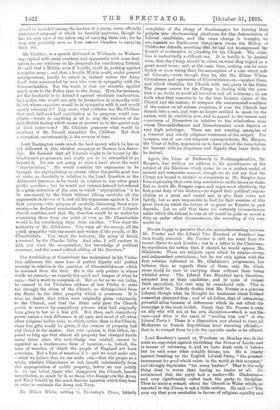The Archbishop of Canterbury has maintained in his Visita- tion
addresses the same tone of perfect dignity and perfect serenity in relation to the question of Disestablishment which - he assumed from the first. He is the only prelate in whose words we cannot,—as regards the spirit and temper of what he says,—find a word to complain of. But so far as we can judge, be seemed in his Visitation address of last Friday to state too strongly the claim of the Church, as distinguished from the State, to the tithe property which it possesses. It is true, no doubt, that tithes were originally given voluntarily to the Church, and that the State only gave the Church power to recover by compulsory process what had originally been given to her as a free gift. But then, such compulsory power makes a vast difference in all ages, and most of all when other religions bodies arise, to which, rather than to the Church, these free gifts would be given, if the owners of property had any choice in the matter. Our own opinion is that tithes, im- posed so long ago that almost all property has changed hands many times since this rent-charge was created, cannot be regarded as a burdensome form of taxation,—is, indeed, the form of taxation of which the people of England are least conscious. But a form of taxation it is ; and we must make out, —what we believe that we can make out,—that the people as a whole, whether Churchmen or not, benefit substantially from this appropriation of public property, before we can justify it. In our belief, those who disapprove the Church, benefit nevertheless, as much by it, as those who disapprove the Army and Navy benefit by the much heavier taxation which they bear in order to maintain the Army and Navy.






































 Previous page
Previous page